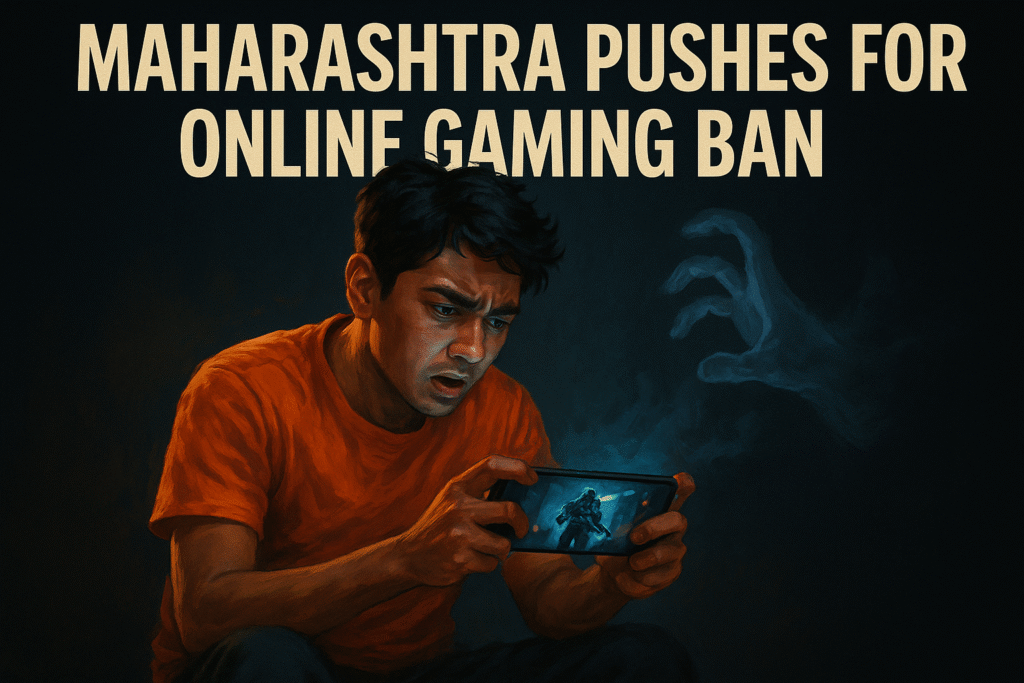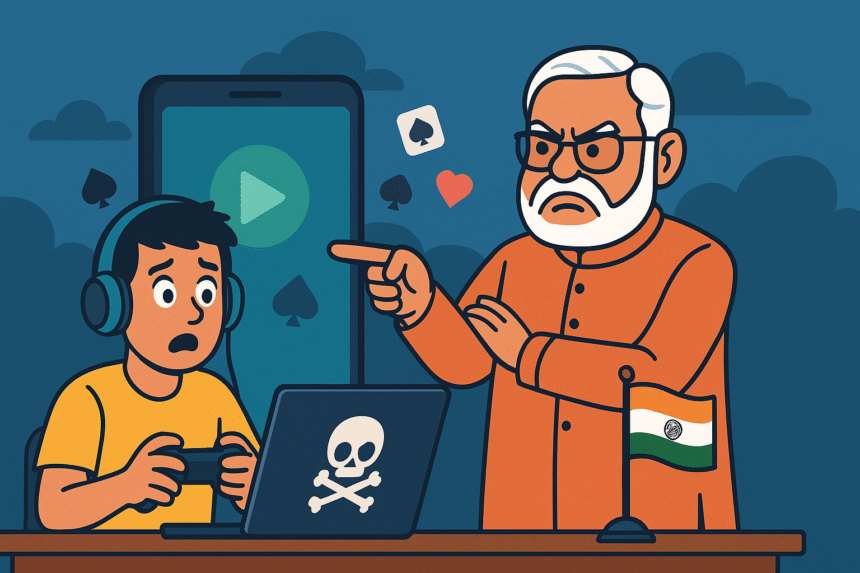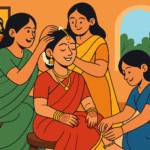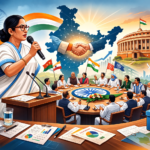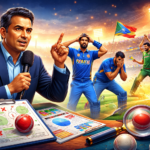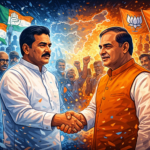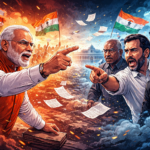India’s Online Gaming Bill 2025 explained with humor. Why Modi govt brought it, what changes for gamers, and how rules may save wallets and sanity.
Imagine this: You’re on the last level of Free Fire, your health bar is down to 1%, and victory is a headshot away—suddenly, your game pauses and a popup flashes:
“As per the Online Gaming Bill 2025, you’ve exceeded your playtime. Please proceed to drink water and meditate. Jai Hind.” 🎮
Sounds funny? Well, welcome to 2025, where the government has decided that your gaming life also needs Sanskaar + Regulation. The Modi government has rolled out the Online Gaming Bill 2025—a legal dhobi ghat to wash away addiction, shady apps, and “diamond pack” scams.
Yes, the same India that couldn’t decide if pineapple belongs on pizza has now decided how long you can play PUBG.
Why Did the Modi Govt Bring the Online Gaming Bill 2025?
The government isn’t doing this just to troll gamers. There are some strong reasons behind it:
- Addiction Crisis – Reports showed kids (and grown-ups who should know better) glued to mobile screens for hours. Families complained, schools complained, even the Wi-Fi router complained.
- Money Madness – In-app purchases were draining wallets faster than Delhi heat drains your energy. Parents discovered their bank accounts were secretly funding “royal passes” and “legendary skins.”
- Fraud Alert – Fake apps, gambling disguised as gaming, and shady platforms were robbing players.
- Data Dilemma – Many apps collected personal data like it was free loot in GTA.
According to India Today Insight, the government wanted to stop “predatory” gaming practices, protect children, and ensure companies pay taxes properly. Because let’s face it—if the government isn’t getting GST from your diamonds, someone’s going to be unhappy.
Key Features of the Online Gaming Bill 2025
Alright, let’s break it down like a gamer tutorial:
- License = Life – Only licensed companies can operate gaming platforms. No license, no entry.
- Age Check Mode – Aadhaar, PAN, or other proof may be required before you download or spend money. “Kids mode” is now government-mandated.
- Spending Caps – In-game purchases will have upper limits. No more “accidentally” spending ₹50,000 on a cricket team card.
- Ad Controls – Ads must be clean, no fake promises like “Win iPhone in 2 minutes.”
- Anti-Gambling Guard – Loot boxes and disguised gambling mechanics face strict restrictions.
- Data Privacy Shield – Apps must ensure your data isn’t sold faster than your PUBG squad gets wiped.
Think of it as a gaming patch update. Only this time, the update comes from Parliament.
How Does This Affect Gamers?
- Age Proof = New Boss Level – You may need to show ID before downloading or buying anything.
- No More All-Nighters – Spending and time restrictions might kick in, so goodbye 3 AM marathons.
- Wallet Protection – Parents will finally stop screaming when they see UPI debits for “gems.”
- Cleaner Games – Less gambling, less fraud, more genuine gameplay.
In short: your game continues, but with a referee who also happens to be the government.
How Does This Affect Gaming Companies?
For gaming companies, this is both challenge and chance.
- Extra paperwork = more compliance cost.
- Startups may struggle, but established giants like Dream11, MPL, and global players may adjust easily.
- Transparent systems could attract foreign investment because rules are now clear.
- But too much regulation might scare off innovation.
In short: It’s like a new map. If you know the rules, you’ll survive. If not, you rage-quit.
The Modi Govt’s Angle
The government has always been cautious about online gambling and addictive platforms. With the Online Gaming Bill 2025, it wants to:
- Protect young citizens from addiction.
- Ensure fair play and transparency.
- Make India a global gaming hub, but responsibly.
- And yes, ensure the tax department also gets its “chicken dinner.”
This is why the Modi govt drew the line here—supporting digital India, but with boundaries.
Funny Side of Reality
Let’s picture some scenarios under the new law:
- A 12-year-old tries to buy a Free Fire diamond pack, but the app asks for Aadhaar. The kid goes, “Papa, OTP chahiye.”
- A pro gamer rages: “Why is my KYC still pending? I just want to kill zombies!”
- Parents throw a party because their kids finally go to bed before midnight.
Somewhere, a startup is already designing a game called: “License Quest: Escape the Bureaucracy.”
Will This Kill the Fun?
Not really. The bill doesn’t ban gaming—it just adds structure. Think of it like cricket with umpires. Sure, sometimes they give LBW against your favorite batsman, but the game survives.
Gamers may feel suffocated initially, but many will benefit—less addiction, less spending, more focus on skill.
Why Should You Care?
Because gaming isn’t just “timepass” anymore. It’s a multi-billion-dollar industry with over 400 million Indian gamers.
The bill affects:
- How kids play.
- How parents pay.
- How companies profit.
So whether you’re a PUBG pro, a Free Fire fan, or a Candy Crush auntie—this law touches you.
Nokjhok Verdict
The Online Gaming Bill 2025 is like that strict tuition teacher—annoying, but useful.
It will protect kids, stop fraud, and give legitimacy to India’s gaming industry. But it may also create red tape and slow down innovation.
The balance between freedom and fairness will decide if this bill is a hero or a buzzkill.
So, fellow gamers—what’s your take? Is this bill a shield saving kids, or a sword killing fun? Comment below, share this article with your squad, and tell us if you’d rather have Modi ji as Prime Minister or PUBG squad leader.
👉 Related Nokjhok Article: “Maharashtra vs. Online Gaming: The Final Boss Battle Begins!”
